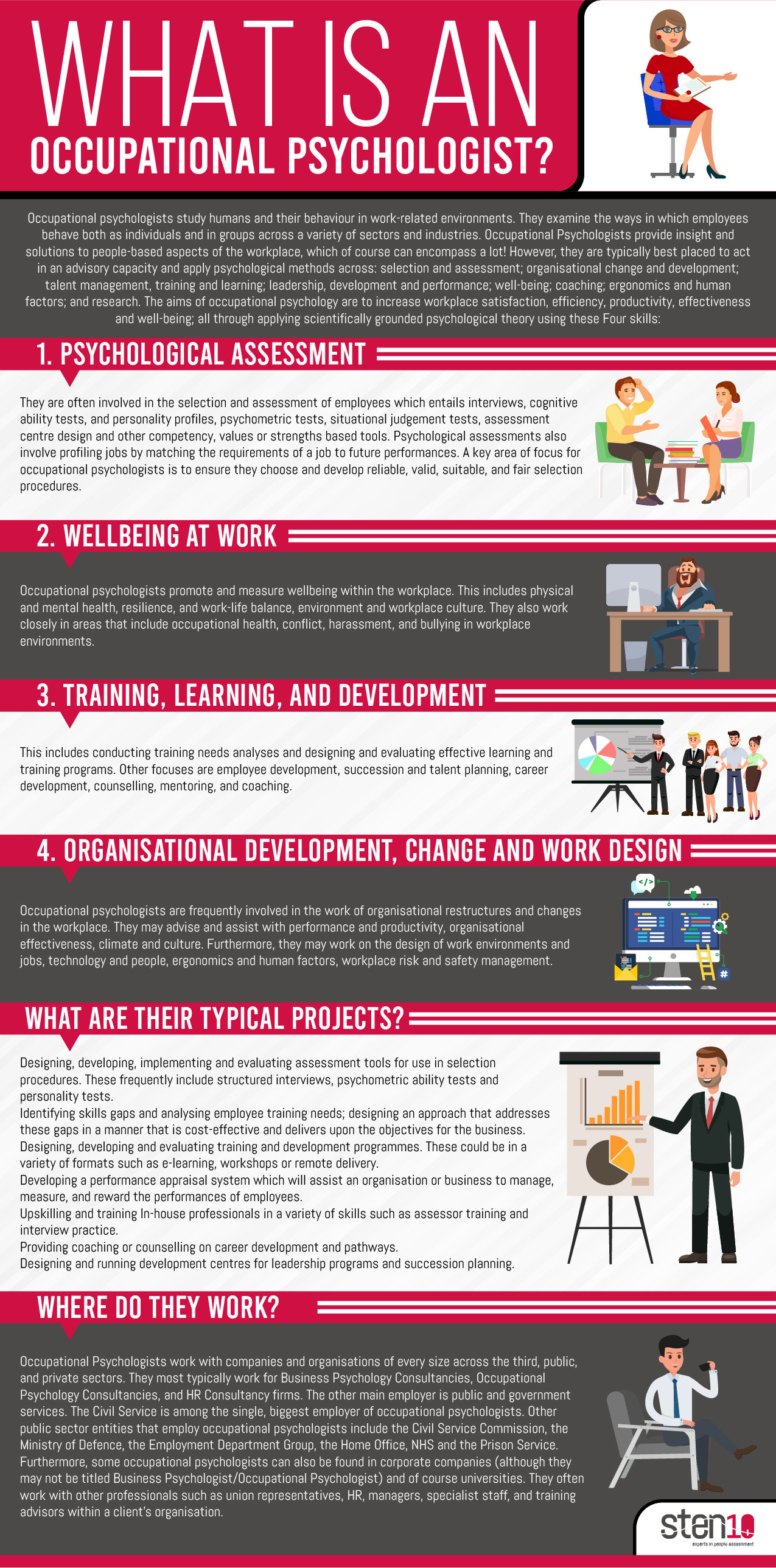Occupational psychologists study humans and their behaviour in work-related environments. They examine the ways in which employees behave both as individuals and in groups across a variety of sectors and industries. Occupational Psychologists provide insight and solutions to people-based aspects of the workplace, which of course can encompass a lot! However, they are typically best placed to act in an advisory capacity and apply psychological methods across: selection and assessment; organisational change and development; talent management, training and learning; leadership, development and performance; well-being; coaching; ergonomics and human factors; and research. The aims of occupational psychology are to increase workplace satisfaction, efficiency, productivity, effectiveness and well-being; all through applying scientifically grounded psychological theory.
How are they different to a Business Psychologist, Work Psychologist, Industrial/Organizational Psychologist etc?
Occupational Psychology is the study of people in the workplace. It is also commonly referenced as business psychology, work psychology, organisational psychology or industrial/organisational psychology. There are a few differences between these terms despite them being sometimes used interchangeably.
- An Occupational Psychologist is a protected title which can officially be used once someone has completed a certified training route, which entails:
- Completing a British Psychological Society (BPS) accredited undergraduate degree in Psychology.
- Completing a BPS accredited Master’s degree in Occupational Psychology
- Undertaking supervised work in an Occupational Psychology based role and submitting a portfolio of evidence against different competencies to the BPS for review. Once the individual meets the agreed standard they are awarded Chartership Status and need to be registered with the Health and Care Professions Council in order to practice and to use this term.
- Therefore, the full title someone could hold would be ‘Chartered Psychologist with the British Psychological Society and Registered Occupational Psychologist with the Health and Care Professions Council’ – but we tend to use Occupational Psychologist for short.
- Note that it is possible to be Chartered with the BPS, but not registered with the Health and Care Professions Council. In this case, someone can call themselves a Chartered Psychologist, but not an Occupational Psychologist. If someone is Chartered, they can use the letters CPsychol after their name.
- The terms Business Psychologist, Work Psychologist, or Organisational Psychologist are not legally protected; but are often used (by both Occupational Psychologists and non-Occupational Psychologists) as they are more widely understood and relatable. ‘Business’ and ‘Work’ Psychologist, specifically, tend to apply to those who typically have a strong academic grounding, but have chosen to pursue more of an applied and practical career route than an academically focused one. Or, they simply haven’t completed the Chartership route as either they are still on the journey; or the nature of the process and the breadth of experience types required does not appeal.
- A relatively new qualification has been launched by the Association for Business Psychology, which offers an alternative to Chartership with the BPS and allows people to say that they are working as a Certified Business Psychologist with the Association for Business Psychology, upon submission of appropriate evidence and an oral viva. Click here for more information.
- An Industrial / Organisational (I/O) Psychologist is a term that tends to be used in the United States. They must have a Masters degree and will often also have a PhD in the subject.
- A Psychometrician is someone who specialises in the construction and analysis of psychometric tests (such as ability tests or personality questionnaires). This is not a protected term in the UK and there is no formal training requirement, although it is a module on Occupational Psychology Masters courses and Masters degrees specialising in just this subject are available. It tends to apply to Occupational Psychologists who are highly numerate and work exclusively in the area of researching, developing and improving these assessment tools. This should not be confused with a Psychometrist, who is someone trained in administering psychological tests to those with brain injuries or psychological health issues.
- Another term which sometimes arises is Associate Fellow, or Fellow, of the British Psychological Society. Associate Fellowship is awarded after a number of years practice and proven competence and allows the person to use the letters AFBPsS after their name. A Fellow (FBPsS) is the highest award the BPS can give and is for those who have made a significant contribution to the field. Click here for more information.
- Chartered Scientist (CSci) is an additional qualification which psychologists who are Chartered with the BPS can apply for by completing a submission that outlines their professional and scientific approach.
This can get confusing, so for simplicity’s sake we will stick with Occupational Psychologist for the rest of this article unless otherwise stated.

How Do They Use Their Skills?
Occupational psychologists analyse, develop, evaluate, and apply various interventions and tools across several aspects of the workplace. Some of these include:
Psychological Assessment
They are often involved in the selection and assessment of employees which entails interviews, cognitive ability tests, and personality profiles, psychometric tests, situational judgement tests, assessment centre design and other competency, values or strengths based tools. Psychological assessments also involve profiling jobs by matching the requirements of a job to future performances. A key area of focus for occupational psychologists is to ensure they choose and develop reliable, valid, suitable, and fair selection procedures.
Wellbeing at Work
Occupational psychologists promote and measure wellbeing within the workplace. This includes physical and mental health, resilience, and work-life balance, environment and workplace culture. They also work closely in areas that include occupational health, conflict, harassment, and bullying in workplace environments.
Training, Learning, and Development
This includes conducting training needs analyses and designing and evaluating effective learning and training programs. Other focuses are employee development, succession and talent planning, career development, counselling, mentoring, and coaching.
Organisational Development, Change and Work Design
Occupational psychologists are frequently involved in the work of organisational restructures and changes in the workplace. They may advise and assist with performance and productivity, organisational effectiveness, climate and culture. Furthermore, they may work on the design of work environments and jobs, technology and people, ergonomics and human factors, workplace risk and safety management.
Typical Projects
Designing, developing, implementing and evaluating assessment tools for use in selection procedures. These frequently include structured interviews, psychometric ability tests and personality tests.
Identifying skills gaps and analysing employee training needs; designing an approach that addresses these gaps in a manner that is cost-effective and delivers upon the objectives for the business.
Designing, developing and evaluating training and development programmes. These could be in a variety of formats such as e-learning, workshops or remote delivery.
Developing a performance appraisal system which will assist an organisation or business to manage, measure, and reward the performances of employees.
Upskilling and training In-house professionals in a variety of skills such as assessor training and interview practice.
Providing coaching or counselling on career development and pathways.
Designing and running development centres for leadership programs and succession planning.
Assessing the functionality and usability of systems such as workstations or computers and making suggestions for improvements.
Conducting investigations on issues that arise pertaining to accidents that may have occurred due to the poor design of human-machine interfaces.
Reviewing the ergonomic design of work environments by assessing whether elements like furniture, noise levels, and lighting are suitable and then offer suggestions for improvements or changes.
Where Do They Work?
Occupational Psychologists work with companies and organisations of every size across the third, public, and private sectors. They most typically work for Business Psychology Consultancies, Occupational Psychology Consultancies, and HR Consultancy firms. The other main employer is public and government services. The Civil Service is among the single, biggest employer of occupational psychologists. Other public sector entities that employ occupational psychologists include the Civil Service Commission, the Ministry of Defence, the Employment Department Group, the Home Office, NHS and the Prison Service. Furthermore, some occupational psychologists can also be found in corporate companies (although they may not be titled Business Psychologist/Occupational Psychologist) and of course universities. They often work with other professionals such as union representatives, HR, managers, specialist staff, and training advisors within a client’s organisation.
Job titles vary hugely from firm to firm and may encompass any of the following; consultant; business psychologist; occupational psychologist; work psychologist; organisational psychologist; or psychometrician.
Due to a variety of job titles and the nature of the specialist and niche field that is occupational psychology, job vacancies and advertisements may not appear widely visible. LinkedIn is where many jobs are advertised, along with the dedicated job pages of the BPS website and the Association of Business Psychology. Otherwise, the websites themselves of the Occupational Psychology Consultancies, job search engines and a good bit of networking!
What Skills Are Important for an Occupational Psychologist?
Occupational Psychologists receive training that covers specific techniques and toolsets to gather, analyse, and provide feedback within organisational contexts. Having undertaken relevant training Occupational Psychologists are equipped with a specialist skillset which incorporates:
Professional skills
This includes implementing legal and ethical standards, teamwork, project management, stakeholder management, creativity and innovation, and communication.
Research Skills
This entails designing, analysing and conducting psychological research over a number of areas along with using several different qualitative and quantitative methods. The ability to analyse and interpret statistical data to determine patterns and trends.
Consultancy Skills
This includes understanding the needs of the client and planning and implementing a solution. Many aspects to client consultancy encompasses gathering data and conducting research; analysing the effectiveness of activity; and, implementing and evaluating tools, interventions and solutions.
Training and Presenting
Occupational Psychologists will become skilled at planning and running training courses and workshops. They will frequently deliver useful, insightful and constructive feedback on a variety of tools, psychometrics and assessment and development centres. They will also develop presentation skills when pitching to clients and sharing research at conferences.



